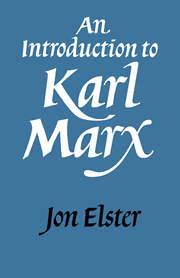Book contents
8 - Marx's Theory of Politics
Published online by Cambridge University Press: 05 January 2012
Summary
INTRODUCTION
There are two perspectives on politics in Marx's writings. On the one hand, politics is part of the superstructure and hence of the forces that oppose social change. The political system stabilizes the dominant economic relations. On the other hand, politics is a medium for revolution and hence for social change. New relations of production are ushered in by political struggles. To see the relation between the two functions of politics, they must be seen in the wider context of historical materialism. This theory affirms that new relations of production emerge when and because the existing ones cease to be optimal for the further development of the productive forces: This is the ultimate explanation of a change in the economic relations. In this transition, political struggle has no independent causal force. It acts as a midwife, bringing about what is doomed to come about sooner or later.
When the new relations have come about, the political movement that brought them into being is solidified into a political system that contributes to keeping them in place. When performing this stabilizing function, politics is initially progressive but later becomes reactionary. It is progressive as long as the relations of production remain optimal for the development of the productive forces; it becomes reactionary when new, superior relations appear at the horizon. In the latter stage, the political system can no longer be explained by its ability to stabilize economic relations, which themselves are further explained by their ability to promote the productive forces at an optimal rate.
- Type
- Chapter
- Information
- An Introduction to Karl Marx , pp. 141 - 167Publisher: Cambridge University PressPrint publication year: 1986



